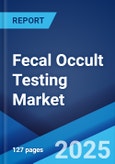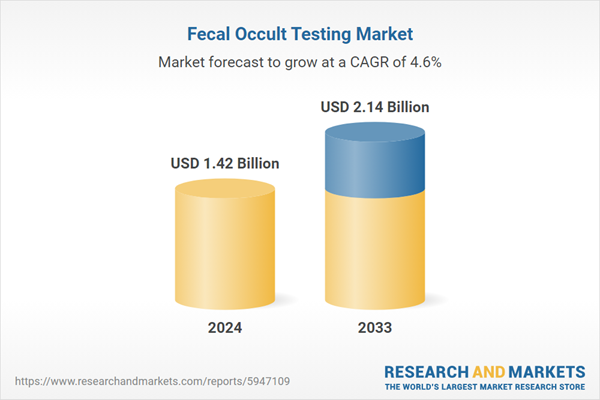A fecal occult blood test (FOBT) is a noninvasive procedure used to detect hidden blood in the feces or stool. It is performed by collecting samples using cards and flushable reagent pads or tissues. These samples are sent to the laboratory for testing and are used to diagnose conditions such as hemorrhoids, diverticulosis, ulcers, colitis, benign tumors and colon polyps or cancer, which cause bleeding in the digestive tract. At present, the growing awareness about early screening is promoting the adoption of fecal occult testing, as it enables quick medical decisions, provides effective healthcare, and leads to improved quality of life and the reduced mortality rate.
The rising focus on integrated health services for improved patient experience and health outcomes, in confluence with the increasing inclination towards point-of-care diagnostics (POCD), represents one of the key factors stimulating the market growth. Apart from this, the rising geriatric population is accelerating the growth of the market as the risk of contracting diseases increases with age. As a result, governing agencies of various countries are implementing several FOBT screening programs for older adults. Furthermore, the widespread adoption of minimally invasive (MI) procedures is contributing to the growth of the market. Besides this, immunochemical fecal occult blood tests (iFOBTs or FITs) are gaining traction as they are easy to use and clinically more sensitive to cancers and advanced adenomas. The easy availability of FOBT devices at online retail stores is anticipated to create a positive impact on the market growth in the upcoming years.
Fecal Occult Testing Market Segmentation:
The publisher provides an analysis of the key trends in each segment of the market, along with forecasts at the global, regional, and country levels for 2025-2033. Our report has categorized the market based on test type and end user.Breakup by Test Type:
- Guaiac FOB Stool Test
- Immuno-FOB Agglutination Test
- Lateral Flow Immuno-FOB Test
- Immuno-FOB ELISA Test
Breakup by End User:
- Hospitals
- Clinical Diagnostic Laboratories
- Physician Office Laboratories
Breakup by Region:
- North America
- United States
- Canada
- Asia-Pacific
- China
- Japan
- India
- South Korea
- Australia
- Indonesia
- Others
- Europe
- Germany
- France
- United Kingdom
- Italy
- Spain
- Russia
- Others
- Latin America
- Brazil
- Mexico
- Others
- Middle East and Africa
Competitive Landscape:
The competitive landscape of the industry has also been examined along with the profiles of the key players being Abbott Laboratories, Beckman Coulter Inc. (Danaher Corporation), Biohit Oyj, EDP Biotech Corporation, Eiken Chemical Co. Ltd., Epigenomics AG, Quest Diagnostics Incorporated, Quidel Corporation and Randox Laboratories Ltd.Key Questions Answered in This Report:
How has the global fecal occult testing market performed so far, and how will it perform in the coming years?What are the drivers, restraints, and opportunities in the global fecal occult testing market?
What is the impact of each driver, restraint, and opportunity on the global fecal occult testing market?
What are the key regional markets?
Which countries represent the most attractive fecal occult testing market?
What is the breakup of the market based on the test type?
Which is the most attractive test type in the fecal occult testing market?
What is the breakup of the market based on the end user?
Which is the most attractive end user in the fecal occult testing market?
What is the competitive structure of the market?
Who are the key players/companies in the global fecal occult testing market?
Table of Contents
Companies Mentioned
- Abbott Laboratories
- Beckman Coulter Inc. (Danaher Corporation)
- Biohit Oyj
- EDP Biotech Corporation
- Eiken Chemical Co. Ltd.
- Epigenomics AG
- Quest Diagnostics Incorporated
- Quidel Corporation
- Randox Laboratories Ltd.
Table Information
| Report Attribute | Details |
|---|---|
| No. of Pages | 127 |
| Published | January 2025 |
| Forecast Period | 2024 - 2033 |
| Estimated Market Value ( USD | $ 1.42 Billion |
| Forecasted Market Value ( USD | $ 2.14 Billion |
| Compound Annual Growth Rate | 4.6% |
| Regions Covered | Global |
| No. of Companies Mentioned | 9 |









